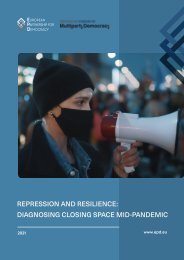Thinking Democratically: A Comprehensive Approach to Countering and Preventing Shrinking Space
You also want an ePaper? Increase the reach of your titles
YUMPU automatically turns print PDFs into web optimized ePapers that Google loves.
In Europe, for instance, where many had taken women’s rights for granted, recent years have seen<br />
a growing backlash against gender equality <strong>and</strong> women’s rights. 65 Populist movements have driven<br />
this backlash, <strong>to</strong>gether with conservative civil society groups.<br />
Some have considered the pushback against progressive causes <strong>and</strong> specific groups of people, <strong>and</strong><br />
the closing of civil society space as two sides of the same coin, while others conceive of it as two<br />
very different phenomena. The case studies do not provide any clear answers on this but do indicate<br />
that a closing of space for certain progressive forces seems <strong>to</strong> come with increased acceptance of<br />
conservative voices. A prominent book on the rise of conservative civil society stresses that: “in some<br />
countries, conservative activism is part of the current threat <strong>to</strong> democracy, but at the same time<br />
this activism is neither necessary <strong>to</strong> nor sufficient for explanations of democratic regression.” 66 It is<br />
important <strong>to</strong> distinguish between conservative civil society <strong>and</strong> ‘uncivil society’, of whom only the<br />
latter actively pursue anti-democratic agendas or even endorse violent tactics.<br />
Activating citizens <strong>to</strong> defend democratic space has, in some countries, been challenging when the<br />
violation of fundamental freedoms <strong>and</strong> democratic principles was not as blatant <strong>and</strong> obvious <strong>to</strong><br />
citizens. The gradual <strong>and</strong> obscure nature of many of the restrictive actions against democratic space<br />
means that pro-democracy collective action is not as easily triggered. At the same time, civil society<br />
organisations also learn from their counterparts abroad. Civil society organisations in different<br />
European countries learned from the closing of democratic space in Pol<strong>and</strong> <strong>and</strong> Hungary <strong>and</strong> adapted<br />
their strategies accordingly in preparation for closing space. 67<br />
A recurring obstacle <strong>to</strong> civil society’s ability <strong>to</strong> organise <strong>and</strong> mobilise citizens <strong>to</strong> protect democratic<br />
space has been the reduction in donor funds. In all of the case studies, civil society suffered under a<br />
reduction in funding from international donors, especially for democracy <strong>and</strong> advocacy projects. This<br />
has greatly limited civil society’s ability <strong>to</strong> counter efforts <strong>to</strong> shrink space. In addition, some cases<br />
exemplified the changing nature of cooperation between donors <strong>and</strong> civil society: due <strong>to</strong> a a shift<br />
from democracy assistance in<strong>to</strong> governance programmes, the government’s control over civil society<br />
support increased, which limited civil society’s ability <strong>to</strong> play a watchdog role <strong>and</strong> engage in<br />
advocacy. Considering the primary responsibility for shrinking democratic space lies with those<br />
controlling government in the cases studied here, this shift is particularly concerning.<br />
65<br />
See amongst others: International Planned Parenthood Federation Network Europe (2018): Compilation of studies on the backlash<br />
against women’s rights <strong>and</strong> gender equality <strong>and</strong> the associated shrinking space for women’s rights organisations <strong>and</strong> defenders in Europe.<br />
European Parliament, FEMM Committee (2018): Backlash in Gender Equality <strong>and</strong> Women’s <strong>and</strong> Girls’ Rights. Available here.<br />
Fundamental Rights Agency (2018): Challenges facing civil society organisations working on human rights in the EU. Available here.<br />
Fundamental Rights Agency (2017): Women's Rights in Turbulent Times: Conclusions of the 2017 Annual Colloquium on Fundamental<br />
Rights. Available here.<br />
66<br />
See Youngs, R. et al, (2018): The Mobilization of Conservative Civil Society. Available here.<br />
67<br />
Negri, G. (2020): How European civil society is pushing back against democratic erosion. Carnegie Europe. Available here.<br />
36

















